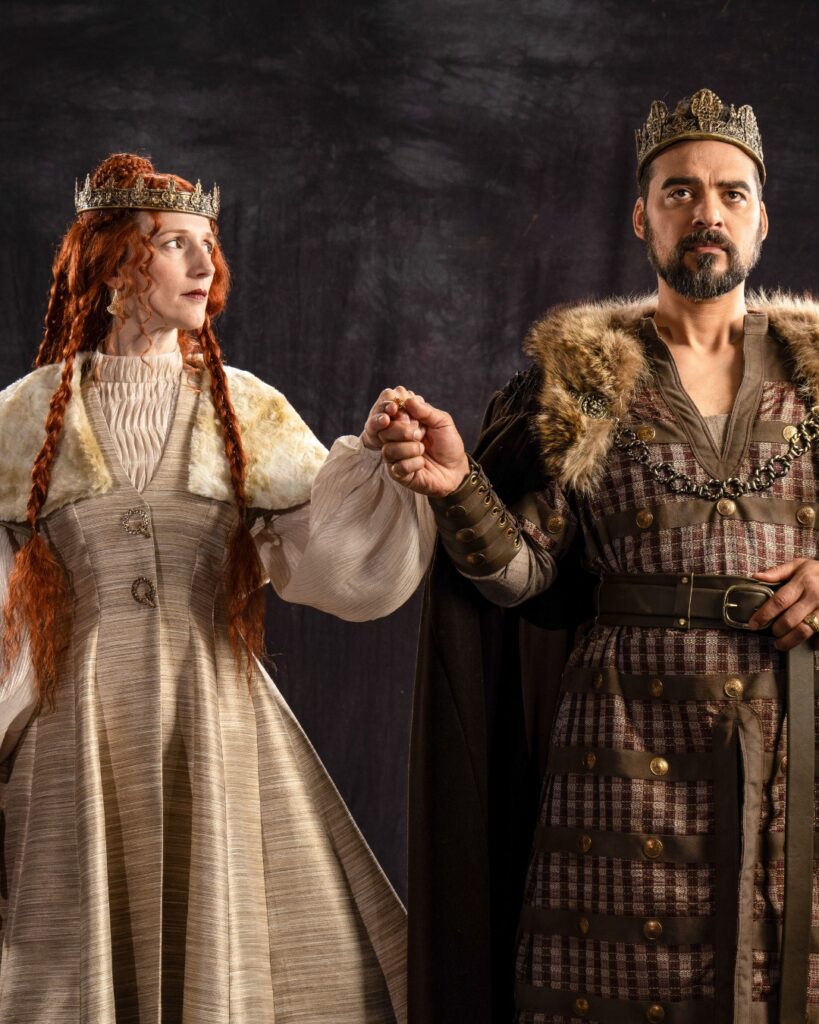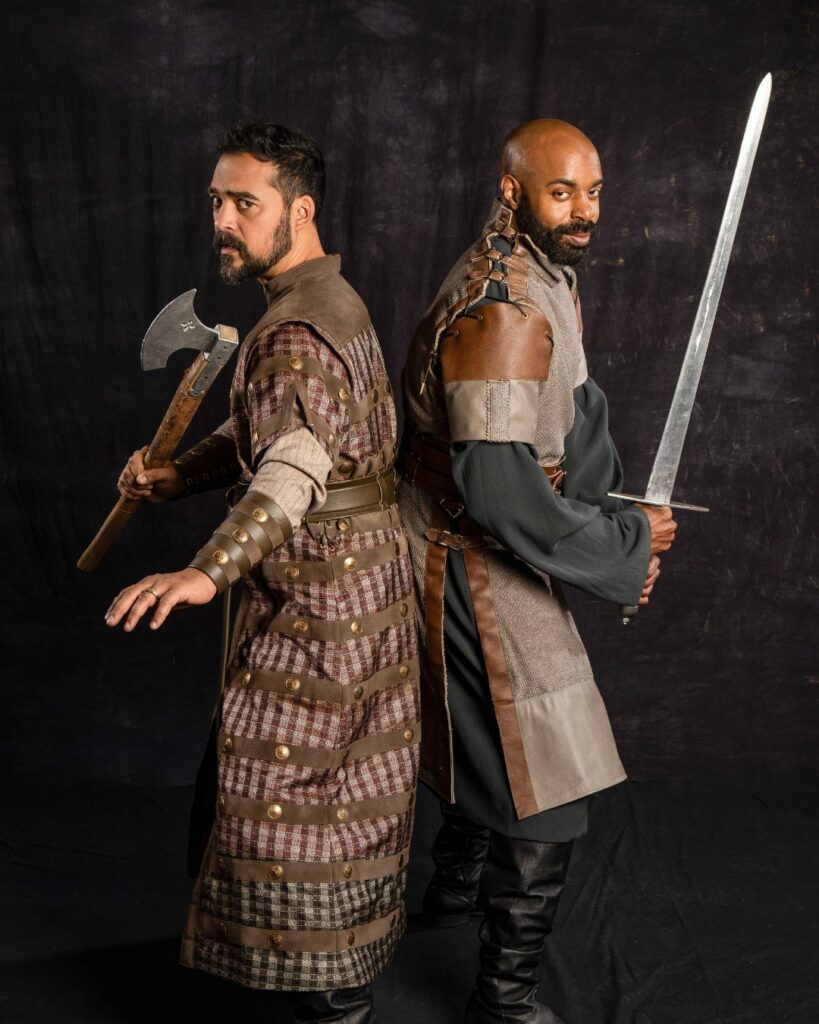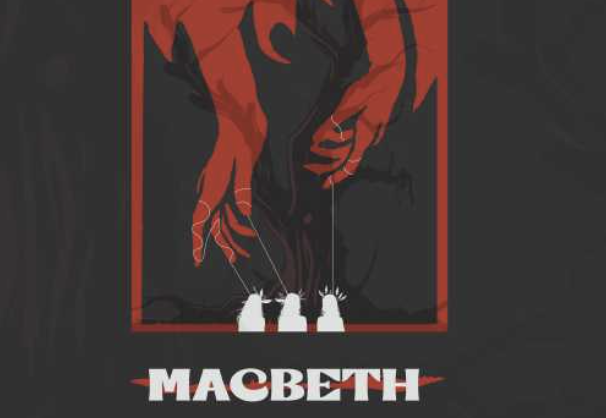By Alisha and Jason Hagey
Utah Shakespeare Festival’s Macbeth explores the devastating nature of unbridled ambition in a dramatic version of William Shakespeare‘s classic tragedy. With the help of careful staging, the atmosphere stays oppressive from the first scene until the last confrontation. The narrative centers on Macbeth, a Scottish general. When he hears three witches predict that he will become king, he is motivated to ensure this happens by killing King Duncan. Afterwards, Macbeth becomes consumed by guilt and paranoia as he ascends to the throne and descends into madness, which leads to the disintegration of his kingdom.
At first, Macbeth plays like a history piece: Henry V in dark clothing. But John DiAntonio (Director) isn’t interested in the familiar. The witches arrive early and unsettle everything. From there, the play slips into a slow spiral of obsession and decay. DiAntonio doesn’t treat Macbeth as a neat tragedy. He treats it like a fever dream dressed in bones. Lighting grows from subtlety to insanity. Sounds crawl up your spine. It’s a kind of theatrical possession where the witches bookend everything and seem to pull the strings all the way through. What’s scary isn’t the violence (though there’s plenty); it’s the feeling that none of this could’ve gone any other way. Macbeth would always end up here: crown cracked, eyes wide, and hands covered in blood.
Walter Kmiec (Macbeth) and Cassandra Bissell (Lady Macbeth) offer focused performances. Kmiec reveals Macbeth’s descent into insanity with quiet intensity and vulnerability, while Bissell brings an unwavering energy to Lady Macbeth’s ambition and eventual collapse. Their scenes together are deliberate, carefully approaching the characters’ shifting relationship and turmoil. What appears to be a partnership quickly turns into a parasitic growth.

Lavour Addison (Macduff) has an undeniable presence. Every line he delivers injects urgency. He connects the two worlds, one of supernatural psychosis and the other of daily life, with gravity and strength.
Chauncy Thomas (Banquo) is equally captivating, particularly in his scenes with the Weird Sisters. His reactions are genuine, drawing the audience into his character’s internal struggle and making his journey deeply engaging. His active listening is beautiful to behold. His moments without dialogue are just as compelling as those with.

Christopher Joel Onken (Malcolm) brings a gentleness to the role. His performance balances fear, resolve, and loyalty, with a sincerity that resonates throughout his scenes. You believe he cares for his men and his country.
Evelyn Carol Case (First Weird Sister), Kayland Jordan (Second Weird Sister), and Kat Lee (Third Weird Sister) add a subtle layer of unease, deepening the play’s atmosphere and reinforcing the sense that Macbeth is nothing more than a puppet to his ambition. Audiences will enjoy their supernatural presence on stage.
Caitlyn Wise (Hecate) embraces the boldness of the part with confidence, fully committing to its heightened and unusual qualities. You don’t often get to see Hecate (the character is usually cut). But Wise’s performance adds a vivid layer to the production, bringing energy and a sense of the unexpected that fits naturally within the play’s darker themes. She is the spectacle, and the audience responds to her in kind.
Patrick Vest (Ross) gives an emotionally honest performance, especially in the scene where he brings the tragic news to Macduff. His delivery carries sorrow. He brings a sense of compassion and realism that stands out in a world filled with turmoil. You want to spend more time with his character because of the understanding he brings to it.
Kathryn Tkel (Lady Macduff) offers the standout performance that is marked by strength and restraint. Her scene with her sons, discussing loyalty and treachery, feels especially real. There’s an underlying power in her portrayal that builds naturally and leaves us wanting more. Her performance grounds the story with emotional truth and clarity, cutting through the visual and the supernatural to find the deeply human. Her struggle to save her sons, her frustration with the world as it is unfolding, and her resolve to face it all are lovely.
Summoning a world with one enormous, versatile piece, Apollo Mark Weaver (Scenic Designer) makes the set feel like something discovered rather than made. It’s raw but also oddly delicate. At the center, a tall, arching tree trunk reaches upward, less like scenery and more like a relic; something sacred that time forgot. And yet, no matter the scene, it holds the actors in a world that feels a little haunted, and entirely plausible.
Lauren Roark (Costume Designer) nods to medieval shapes, but the costumes don’t feel trapped in the past. Each piece seems built around the person wearing it, not just the era. You can almost read the characters through what they wear: the weight of status, the trace of rebellion, the quiet pride. In a cast of distinct voices, Roark ensures no one disappears into the background. The details – leathers worn soft, fabrics that carry elegance and grit – tell their stories. There’s cohesion, but also a striking sense that each costume belongs to one specific body, one specific life.
Shannon McKinney’s (Lighting Designer) work feels less like technical toil and more like quiet magic. Sometimes the lighting shifts so subtly that you don’t even notice it at first, only that something feels different – the mood changes, almost without explanation. Then, almost without warning, the light shifts and the entire moment sharpens into something clear and unforgettable. Truly, McKinney’s lighting is one of the best parts of the show.
In a dual role, Lindsay Jones (Sound Designer/Original Music Composer) uses sound with a sharp sense of purpose. Jones knows precisely how to set the mood and raise the stakes. The sound drives the story, pulling the audience deeper into each moment.
Trey Plutnicki (Choreographer) and Geoffrey Kent (Fight Director) bring a raw, physical energy to the stage. The action is brutal. Every blow lands with weight. There’s no physical blood, but you still feel it. It’s more than just combat; it’s a story told through bodies in motion. And it lingers.This production of Macbeth brings energy and visual interest to the theatre. The creative staging and spirited performances offer moments that draw you in. At times, theatrical playfulness and striking spectacle help a classic tragedy feel fresh, making for a memorable evening.
Utah Shakespeare Festival presents Macbeth by William Shakespeare
June 16 – September 4, 2025
195 W Center Street, Cedar City, Utah. 84720
Engelstad Shakespeare Theatre
Tickets: $25-$85
800-PLAYTIX or 866-962-9897
Ticket Office Hours:
Performance Days: 10 am-8 pm, with phone service ending at 7 pm
Non-performance Days: 10 am-5 pm, Monday through Saturday
Utah Shakespeare Festival
Utah Shakespeare Festival Macbeth Site
Utah Shakespeare Festival Facebook
Utah Shakespeare Festival Instagram
Child/Student Discount
Children ages six to eighteen, and students of any age older than six with a valid student ID or proof of student status can receive a discount of $10 off any ticket. This is available online or through the Ticket Office.
Content Advisory
This dark tragedy explores profound and disturbing themes, including violence and murder, moral corruption, the supernatural, death of children and families, and mental health struggles. And there are witches, too.



0 Comments